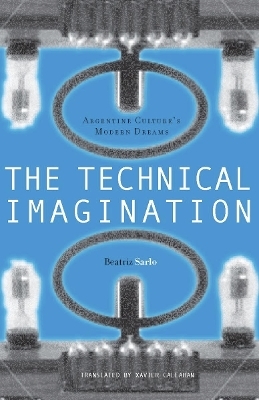
The Technical Imagination
Argentine Culture's Modern Dreams
Seiten
2007
Stanford University Press (Verlag)
978-0-8047-3542-1 (ISBN)
Stanford University Press (Verlag)
978-0-8047-3542-1 (ISBN)
- Lieferbar (Termin unbekannt)
- Versandkostenfrei innerhalb Deutschlands
- Auch auf Rechnung
- Verfügbarkeit in der Filiale vor Ort prüfen
- Artikel merken
The Technical Imagination explores how technology entered the popular imagination in the Argentina of the 1920s and 1930s and how its products helped to shape modern thinking at all levels of Argentine society.
In what Beatriz Sarlo calls six "episodes," ranging from the proto–science fiction of Horacio Quiroga and the apocalyptic urban surrealism of Roberto Arlt through the development of mass media, tales of inventors and inventions, and an entertaining tour of "weird science" and medical quackery, The Technical Imagination examines how technology entered the popular imagination in 1920s and 1930s Argentina. Often wry, but always sympathetic, and dispensing erudition with a light touch, Sarlo shows how the products of modern technology (radio, the telephone and telegraph, movies, and rudimentary forays into television, among other phenomena) announced an unprecedented break with the past while also provoking an ironic recrudescence of age-old superstitions. Although the new technologies helped to shape notions of modernity at all levels of Argentine society, Sarlo focuses particularly on the working-class amateur inventors of Buenos Aires, and on how their inventions—even when they failed, as they frequently did—point to what can be recognized today as the reorganization of an intellectual hierarchy, and thus of an era's, and a culture's, intellectual history.
In what Beatriz Sarlo calls six "episodes," ranging from the proto–science fiction of Horacio Quiroga and the apocalyptic urban surrealism of Roberto Arlt through the development of mass media, tales of inventors and inventions, and an entertaining tour of "weird science" and medical quackery, The Technical Imagination examines how technology entered the popular imagination in 1920s and 1930s Argentina. Often wry, but always sympathetic, and dispensing erudition with a light touch, Sarlo shows how the products of modern technology (radio, the telephone and telegraph, movies, and rudimentary forays into television, among other phenomena) announced an unprecedented break with the past while also provoking an ironic recrudescence of age-old superstitions. Although the new technologies helped to shape notions of modernity at all levels of Argentine society, Sarlo focuses particularly on the working-class amateur inventors of Buenos Aires, and on how their inventions—even when they failed, as they frequently did—point to what can be recognized today as the reorganization of an intellectual hierarchy, and thus of an era's, and a culture's, intellectual history.
Beatriz Sarlo, one of the most important literary and cultural critics in Argentina and all of Latin America, was a founder of the progressive journal Punto de Vista. She is currently a professor in the Department of Philosophy and Literature at the Universidad de Buenos Aires.
Contents Acknowledgmentsix Translator's Notexi Introduction1 Part I. Letters000 1.Horacio Quiroga and Technoscientific Theory000 2.Arlt: Technology in the City000 3.Popular Science and the Popularizing Press000 Part II. Histories000 4.Inventors: Technology and Mythmaking000 5.Radio, Cinema, and Television: Long-Distance Communication000 6.Doctors, Clairvoyants, and Quacks000
| Erscheint lt. Verlag | 13.12.2007 |
|---|---|
| Reihe/Serie | Writing Science |
| Übersetzer | Xavier Callahan |
| Verlagsort | Palo Alto |
| Sprache | englisch |
| Maße | 140 x 216 mm |
| Gewicht | 381 g |
| Themenwelt | Geschichte ► Allgemeine Geschichte ► 1918 bis 1945 |
| Geisteswissenschaften ► Geschichte ► Regional- / Ländergeschichte | |
| Geschichte ► Teilgebiete der Geschichte ► Technikgeschichte | |
| Sozialwissenschaften | |
| ISBN-10 | 0-8047-3542-5 / 0804735425 |
| ISBN-13 | 978-0-8047-3542-1 / 9780804735421 |
| Zustand | Neuware |
| Haben Sie eine Frage zum Produkt? |
Mehr entdecken
aus dem Bereich
aus dem Bereich
ein Psychologe erlebt das Konzentrationslager
Buch | Hardcover (2024)
Kösel (Verlag)
22,00 €
Mythos „Stauffenberg-Attentat“ – wie der 20. Juli 1944 verklärt und …
Buch | Hardcover (2024)
Goldmann (Verlag)
24,00 €
die letzte Woche des Dritten Reiches
Buch | Softcover (2023)
C.H.Beck (Verlag)
16,00 €


